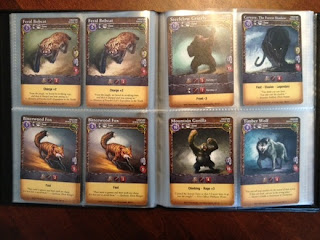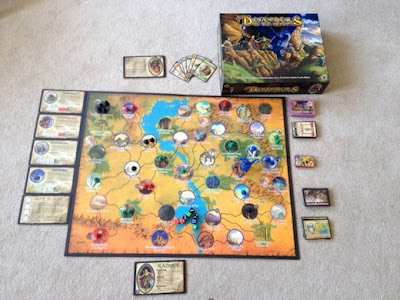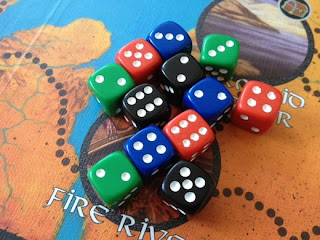A game that I've been excited to try for quite a while is
Mage Wars.
In Mage Wars, each player takes on the role of a mage with the goal of knocking out the opposing mage (in case you didn't get that from the title). To do this, each round both of the players "prepare" two spells from their spellbook (deck) by setting them aside - these are the only spells that the player will be able to play that round. After this, players will alternate taking actions with their creatures (mages and and any creature spells their mage had previously cast) until both players have run out of actions. (The mage gets a bonus action called a "quickcast" action that he can play amidst other actions.) When a creature takes an action, it can include moving and taking a quick action, or just taking a slow action. There are a lot of different quick actions, but some of them include casting certain spells, attacking (sometimes), moving again, "guarding" (becoming the target of attacks), and many other things. After both players run out of actions, they set everything back up, switch who starts the round, gain more mana, and pick new spells. Once one mage is knocked out, the game is over, and the other player wins.
Mage Wars is really an interesting game, and I'm already finding it difficult to explain most of it. There is really a lot going on with the game, and this has translated into causing me difficulty in explaining it. So, really, as my first pro, I will mention that I think that there are layers of strategy in the game. The first time or two that you play it, you will be overwhelmed. So, you'll just be doing basic things - cast creatures, and charge forward. Or, cast some equipment with your mage, and cast giant fireball spells at your opponent. But, as you play it more, you realize some more things that you can do. In your next games, you might start guarding more. Or, you might explore damage barriers. As you've grown familiar with those, there are more options that you can start to use. After you have a lot of those things down, then you can explore the deck building options.
 |
| It comes with everything you need - and more |
Speaking of deck building options, this brings me to my second pro. I
love the fact that they give you extra cards in the box. This is basically the exact opposite of how Fantasy Flight handles their card games. In Mage Wars, you have a lot of cards in the box that don't actually go into any of the base decks - they are only there for deck building purposes once you have mastered the basic game. Now, with that said, I really need to mention one of the things that greatly annoyed me about the game. There are four mages in the base game, and in the instructions, they tell you the cards to include in each of these mage's basic deck. However, there aren't enough cards in the base set to have all four of these decks built at the same time, so you're forced to constantly destroy and re-build their decks! This is awful and makes the setup time much longer than it should be. Fortunately, this leads back to a pro - Arcane Wonders (the company that made Mage Wars) actually listens to their fans! I wasn't the only one that hated this, and so they provided an altered version of the starting decks so that you can actually have all four of them built at the same time. If you're interested, you can see those decks
here, under the "Updated Spell Lists" section.
The next pro that I have for the game is that I thought that it brought some new and interesting mechanics to the fantasy skirmish genre. Specifically, I thought that the quickcast option and the enchantments were interesting. In Mage Wars, you don't really have an option of interrupting someone else's actions when they are performing them. The closest things that you can do are a quickcast action and an enchantment. You can only perform a quickcast action on your turn, but you can do this action before or after any other action that you perform (but only once per round). With an enchantment, you have to cast it on your turn, but when you cast it, you play it facedown. You may then immediately reveal the enchantment or wait until a later turn (either player's turn). When you reveal the enchantment, you have to pay its cost, but it is immediately in play and affects its target. So, if you see that your opponent is about to attack your mage, you can suddenly reveal an enchantment that will improve your defense. But, if you hadn't planned ahead, and you have no enchantments (or not enough mana to reveal the enchantment), then you just have to sit back and hope that your opponent rolls poorly.
 |
| A heated battle between the Beastmaster and Wizard |
Now that I've covered my pros, there are a few things to mention about Mage Wars that are really just things that I think you should be aware of. First off, all damage is dealt with rolling lots of dice. This isn't terribly uncommon in strategy games, but it does present a situation where you might play the perfect combination of attack cards just to have the dice go against you and you miss entirely. Something that adds to this is that there is a "defense" ability in the game that allows you to completely avoid an attack. To determine if the defense allows you to avoid the attacker, you roll a die. So, though there is a lot of strategy in the game, the actual results will definitely be impacted by luck.
The next thing that you need to be aware of is that every turn, you can select
any two spells from your spellbook - not the two that are "in your hand." Because you don't have a hand of cards. You don't draw cards. They are
all available from the beginning. This is really interesting, but it has some effects on the game. First, it means that whenever you teach the game to someone new, you better be prepared to entertain yourself for quite a while as they read through all of their spells. And, when they switch decks and use a different mage, you better be prepared to do it again. That problem goes away as you grow more familiar with the game. The greater concern that I have is whether there will be a ridiculous combination of cards that is discovered and it becomes the strategy that everyone uses. Obviously, there is nothing forcing anyone that plays Mage Wars to use one strategy over another, but I can see a situation where there are a group of cards that become the "standard" opening play for certain mages, just because they are so powerful. I haven't played the game enough to claim to know one of these strategies, but having seen all of the instant win combinations in Magic the Gathering (that only work if you draw the right cards), I do have some concerns.
Last thing you should know before moving onto the cons - I
hate Sleep. This isn't a con, because I'm not claiming that Sleep is overpowered. But, when someone casts Sleep on me, it makes me angry enough to want to throw things at them. I think that part of this is because in the basic decks there are very few counter cards; and so, if someone manages to cast sleep on me multiple times, there is very little I can do about it. They have basically removed one of my creatures from the game, unless I choose to attack my own creature to wake them up. Sleep angers me to even think about right now, so I should move on.
 |
| Your spellbook - prepare any two spells |
With all that said, I do have a major con to Mage Wars. Teaching this game (or learning it for the first time) is ridiculous. I already mentioned that every spell in your spellbook is legal to play, so even if the game were incredibly simple, your first game would take quite a while. However, the game is not simple - it has 45 pages of rules. And, in those rules, the last 5 pages go over keywords that you will encounter on your cards. So, now instead of just reading through all of your cards, you're also having to look up what these cards do. I'm not saying that this makes Mage Wars a bad game. I am saying that I wish there were some way to avoid this, as it makes me never want to teach Mage Wars to anybody, but to only play it with my friends that already know how to play. I honestly believe that it will take 30-60 minutes before you start your first game of Mage Wars -
if someone is teaching you. It will take even longer if you are learning it from the rulebook. And, in that first game, you will probably just be playing somewhat random spells in order to see what happens (and because you feel bad about making the game take so long). One of my friends likes to point out that everything in it "just makes sense," and so he claims that it's not that hard to learn. But, even with him teaching it, it still took me over 30 minutes to start playing. Be ready for this if you decide that you want to try Mage Wars.
Overall, I give Mage Wars an 8.5/10. The game is actually pretty fun (when Sleep isn't being cast on you). I have some concerns that a "broken" strategy will emerge in the game (though I hate to use that term and I'm not saying that one currently exists), and I really have no interest in teaching it to new people. With that said, the games that I've played have been quite enjoyable, and I'd be interested in playing it some more.
If you're interested in Mage Wars, you might also want to check out
Summoner Wars,
Dungeon Command, and
Twilight Struggle. Or, if you're on the fence about it and want another opinion, check out Play Board Games'
Mage Wars Review.
I would like to thank Arcane Wonders for providing me with a review copy of Mage Wars.







